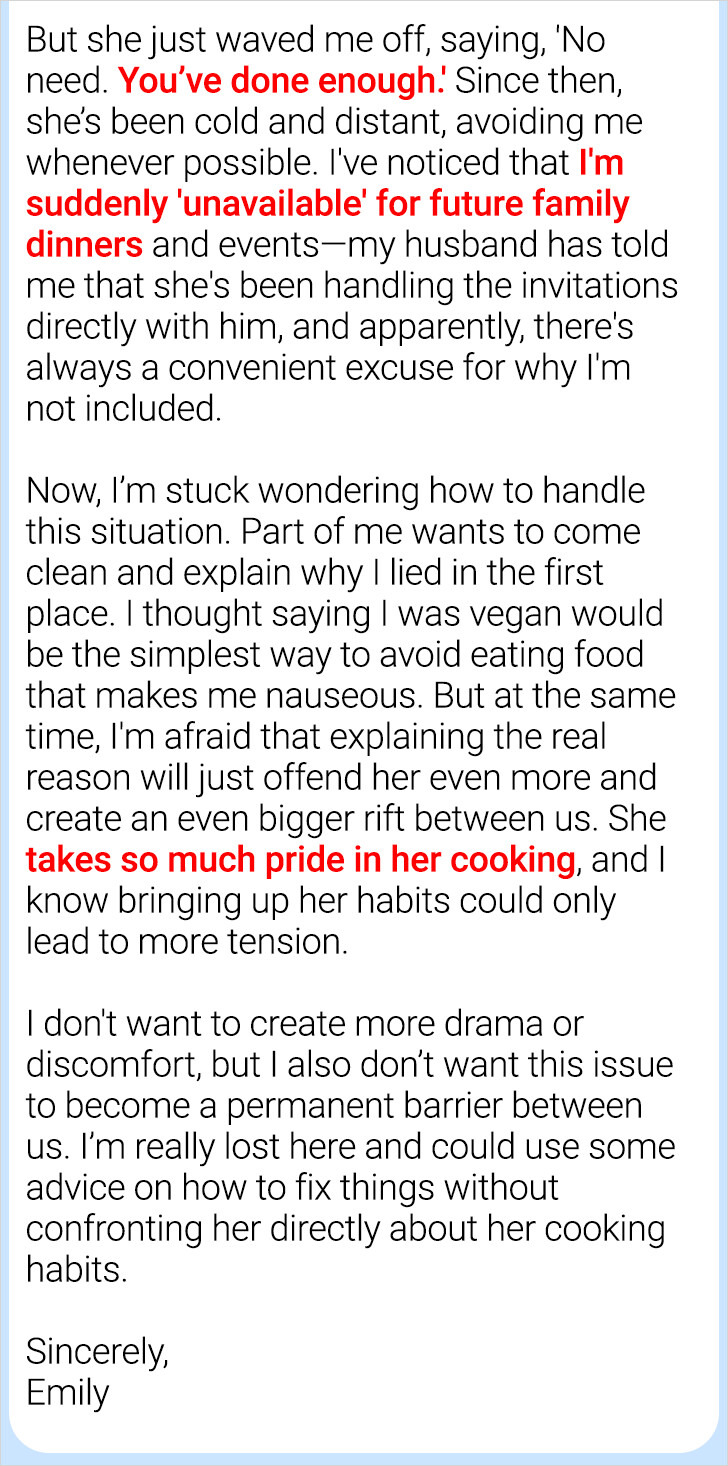Honesty means telling her she grosses you out.. let it be..you cant eat her cooking anymore anyways
I Lied About Being Vegan to Avoid My MIL’s Bad Cooking
Navigating relationships with your mother-in-law can be complicated. It’s hard to maintain your boundaries and express disagreements without causing drama. Even if you don’t live under the same roof as your in-laws, conflicts can still arise. That’s exactly what happened to our reader Emily, who reached out to Bright Side asking for advice.


Thank you, Emily, for sharing your story with us. We understand that this situation is complicated and appreciate your trust and hope the advice we’ve gathered will be helpful to you.
Apologize for the lie.
Start the conversation by admitting that you lied about being vegan, and express your genuine regret for doing so. Be honest about your intentions, explaining that you were trying to avoid an uncomfortable situation, not to deceive or disrespect her cooking.
For example, you might say, “I’m really sorry for not being truthful about my dietary choices. I wasn’t sure how to bring up my discomfort and didn’t want to hurt your feelings. I made the wrong decision, and I hope you can understand that my intention was to avoid any conflict.” A heartfelt apology can go a long way in starting to mend the relationship.
Acknowledge her feelings.
Recognize that your mother-in-law might feel hurt and offended by the discovery that you were not truthful. Express empathy by saying something like, “I can understand why you might be upset and feel insulted. I know that you put a lot of effort into cooking for the family, and it probably seems like I didn’t appreciate that.”
Showing that you are aware of her feelings can make her feel validated and respected, which may help soften her stance and open the door for further communication.
Avoid criticizing her cooking directly.
If you find it necessary to explain why you lied, be very cautious not to criticize her cooking methods directly. Instead, frame the situation around your own preferences or sensitivities.
For example, you could say, “I have certain habits around food preparation that make me feel more comfortable. I didn’t know how to bring this up without coming off as rude, so I took the easy way out by claiming to be vegan. That was wrong of me.”
Instead of criticizing her, talk about your own feelings. This way, the conversation stays about your emotions and doesn’t turn into a personal attack.
Express gratitude.
Remind her how much you appreciate her dedication to cooking for the family. You could say, “I truly admire how you always take the time to cook for everyone. It’s clear that you put a lot of love and effort into every meal, and I want you to know how much that means to us.”
Showing your gratitude can help her feel less rejected or insulted, and it shows that you didn’t mean to disregard her efforts.
Extend an olive branch.
Consider reaching out with a small but meaningful gesture to show that you want to mend the relationship. Invite her out for coffee or lunch in a friendly and relaxed setting. Taking this step shows that you care about your bond and are willing to make an effort to reconnect.
A warm, one-on-one setting can also provide an opportunity for an honest conversation in a less pressured environment.
Dealing with in-laws can be tricky, especially when money is involved. Helping out financially can strain relationships. One reader faced a tough choice: she wanted to support her mother-in-law but also needed to protect her own family’s finances.
Comments
Wait. U had half a burger in handbag? 🤯
Related Reads
11 Real-Life Stories That Prove Family Love Has No Limits

My Husband Caught Me Lying; He Blew Up and Took It Out on My Daughter Instead

My Kid Frightened Her Therapist, and the Doctor Revealed an Awful Truth

My MIL Wants to Take My Yet Unborn Baby From Me, Because I Don’t Want to Play by Her Rules

My Husband Married Me for Money, but He Met His Karma When My Famous Wealthy Dad Passed

Ben Affleck’s New Look Sparks Controversy, and People Think Jennifer Lopez Is to Blame

I Want to Divorce My Husband Because He Shaved My Head

My Sister-in-Law Secretly Tested My Adopted Daughter’s DNA

12 Disturbing Secrets People Realized Only Later On

10 Terrifying True Stories to Keep You Awake All Night

Pierce Brosnan’s Wife Stuns People With Her Transformation During Her Latest Appearance

15+ Last-Minute Choices That Turned Ordinary Days Into Extraordinary Stories





